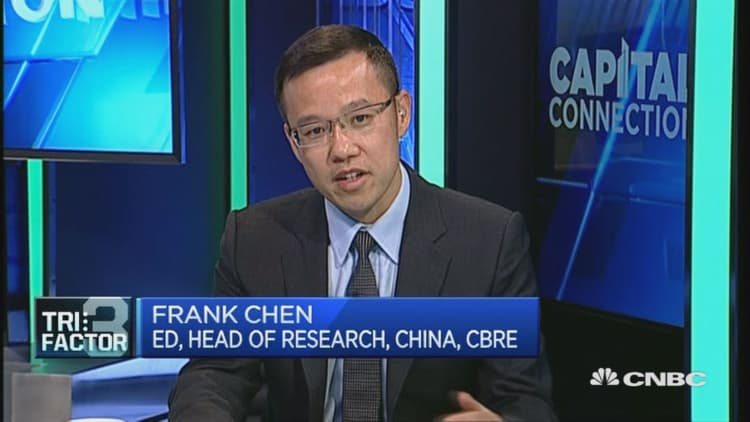
In Beijing, where schools go, money follows.
In 2014 the Chinese capital changed policy; enrollment in public primary schools would be based entirely on students' home addresses, not their entrance exam results.
Since then, Chinese parents, who're already inclined to spend big when it comes to their children's education, have rushed to purchase properties close to the city's top schools.
Peter Zeng, 36, is preparing his five-year-old daughter to attend one of the best schools in Beijing. In September Zeng spent nearly 3.95 million yuan ($610,000) on a 46-square-meter (495 square-foot) apartment in the school district of Zhongguancun No.3 Primary School, a well-known school in Beijing.
Zeng, who calls himself white-collar middle class, told CNBC that his family lived in another three-bedroom apartment in the city and had no plan to move; purchasing the new apartment was solely to ensure his daughter would be admitted to the well-known school.
"We are not going to live there because the one-bedroom is too small," Zeng said. "I'm planning to rent it out, and then, apply [for] home mortgage loans for further investments."
Increasing your capital in China's capital
Zang's investment strategy on Beijing's properties has been profitable so far.
The average home price in China tripled between 2003 and mid-2008, but cooled in the second half of 2008 due to economic uncertainties brought by the global financial crisis. Then on November 9, 2008, China announced a 4 trillion yuan ($586 billion) stimulus package, which stirred another housing boom and accompanying surge in debt that peaked in 2013, before the government initiated a series of measures to cool the property market.
In 2009, expecting Beijing's home prices to keep climbing, Zeng bought a two-bedroom apartment in Beijing's Shuangjing neighborhood for 1.8 million yuan ($280,000). He sold the two-bedder for 4.05 million yuan ($620,000) last year and was able to buy the school-district apartment in cash.
"With this property, I can now borrow 3 million yuan [$460,000] from the bank with an interest rate as low as 4.9 percent," he said. "It's like free money!"
Déjà vu of 2009?
Zeng said the current housing boom reminded him of 2009.

"The housing market is as crazy as back then," he recalled. "There is no chance for buyers to bargain. If you don't take the apartment immediately, it's gone the next day."
Home prices in other Chinese top cities have skyrocketed in the past year. Shenzhen topped the table with a 52.7 percent leap, the fastest annual pace of price growth since 2011. Shanghai jumped 21.4 percent, while Beijing had an 11.3 percent rise, China's official Xinhua News Agency reported.
Analysts also believed that capital flowing out of China's equity market is fueling property investment. With Chinese stocks locked in a bear market and bond yields hovering near all-time lows, investors' savings have no where to go except into real estate.
"A lot of people suffered big losses last year in the Chinese stock market," said David Ji, director and head of research and consultancy for Greater China at Knight Frank. "They are getting back to properties."
Ji told CNBC in a phone interview that demand was also boosted due to the relaxation of Home Purchase Restrictions (HPR) across the country since 2014, as well as by monetary stimulus from the People's Bank of China (PBOC) as part of a broader attempt to fuel the growth of the world's second-largest economy.
The PBOC has cut benchmark lending rates five times since 2015, to the current level of 4.35 percent. Meanwhile, the reserve requirement ratio (RRR), which sets the proportion of deposits that banks must hold in cash, has been lowered six times, with the latest 0.5-percent adjustment coming in on February 29, taking the RRR to 17 percent.
These measures have been read as attempts to lower borrowing costs by flooding China's banking system with extra cash to lend.
All cities are not equal
After the Chinese government hinted of its intention to support the property market, Knight Frank's Ji saw immediate actions from buyers who had been playing the "wait and see" game.
"It's largely driven by owner occupation instead of speculation," he said.
Yang, a property developer based in Shenzhen, who asked CNBC not use his full name, agreed.
"Speculators are less than 10 percent," said Yang. "Twenty percent of buyers are upgrading their homes while the remaining 70 percent have true demand."
The developer expects an additional 5 to 10 percent rise on Shenzhen's home prices by the end of this year, while Beijing's might rise a further 15 percent.

Eighty percent of home buyers in Shenzhen are outsiders, according to Yang. With the city on track to become China's southern economic hub - it boasts the country's second-largest stock exchange - young professionals as well as migrants have rushed in.
According to government data, outsiders account for more than 70 percent of Shenzhen's population of 13 million; the ratio in Beijing has climbed to almost 40 percent.
"I will only invest in Beijing and Shenzhen in the next three years," Yang told CNBC. "Don't worry about top-tiers cities. Prices will continue to go up for the next two to three years."
However, it is a totally different story for the rest of the country.
Is this where the real problem lies?
While the boom is extreme in major Chinese cities, prices in smaller cities have remained sluggish, or have even fallen.
The latest data showed that China had unsold housing inventory equivalent to 720 million square meters, of which 70 percent was in third- and fourth-tier cities, Xinhua reported at the weekend, citing Pan Gongsheng, the PBOC's deputy governor.
"What happened is that housing purchases didn't catch up with the construction boom," said Ji. "Inventories have been built up in lower-tier cities by smaller developers, and now they don't get cash flow going."
Facing mounting newly-built inventories, which analysts say might take years for the market to digest, small developers are desperate, and so are local governments.

On March 1, Shenyang, a tier-2 city, said that college student and recent graduates would be legible to purchase homes with zero down payment and in addition, would receive subsidies on purchases and tax.
The policy immediately triggered massive criticism on Chinese social media, however, with many worried about a potential debt crisis brought by an over-leveraged property market, and the city government of Shenyang quickly said the policy was not ready to be rolled out yet.
The city, situated in China's northeast Liaoning province, saw new-home prices slip 0.5 percent in January, taking their total fall since March 2015 to 5.1 percent, according to data provided by jiwu.com, China's Shenzhen-based real restate portal.
Shen Yan, a 24-year-old Shenyang resident who graduated in 2014, told CNBC that he would take advantage of the zero down-payment policy if it ever took effect, but said he saw very little current demand for property.
"People around me already have had at least two apartments," said Yan. "There is no demand from local residents, and the city's north side is almost like a ghost town. There's no better ways to reduce the inventory if we can't attract more people coming to Shenyang."
Whom to rely on? Farmers!
Yan's concerns may have been shared by Chinese policymakers.
In an effort to resolve housing gluts in lower-tier cities, more than 100 cities in China have initiated measures including tax cuts and cash subsides to encourage rural dwellers to move to cities and buy urban properties.
However, many have questioned the effectiveness of such policies.
"It's impossible to depend on farmers to digest inventories," said Yang. "They simply can't afford it!"
Yang, the Shenzhen property developer, told CNBC in a phone interview that he saw two reasons why cutting property inventories was such a difficult task in lower-tier cities.
On one hand, wealthy families - if they had the ability to transfer money - have already parked their cash in properties overseas, because they feared both the yuan depreciating and China's housing bubble bursting.
On the other hand, many middle income-earners sold properties last year in order to free up cash in the hope of catching the stock market rally. Instead, China's benchmark index plunged more than 40 percent from its June peak, eating up investors' capital.
"They no longer have money on hand to buy new homes even if they want to invest," Yang said. "The solution is the stock market. After people pare their losses in the stock market, they have cash to buy homes."
Meanwhile, rumors of leveraged speculators in tier 1 cities have triggered concerns.
According to Xinhua, the Chinese government is studying policies to cool some of the over-heating markets, in order to "ensure the prices are in a reasonable range."
Analysts predict more city-differentiated policies are on the way – more loosening in third- and fourth-tier cities to shrink inventories, and stricter policies in first-tier cities to cap surging prices.
Bloomberg reported on Friday that the surge in Shanghai's property prices prompted authorities to meet to discuss policies to douse the city's red-hot sales environment.
China is due to release data on February home prices on March 18 at 9.30 a.m. SIN/HK.
However, Ji is unconcerned.
"The down-payment ratio is still healthy in China," the Knight Frank analyst said. "The standard mortgage RTB (right to buy) is 30 percent and you borrow 70 percent in mainland. In Hong Kong, before the financial crisis, we saw many borrowing 90 percent. [The credit risk] is not yet a problem in China."


